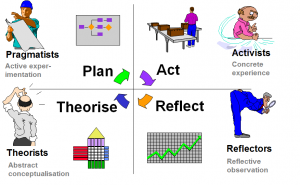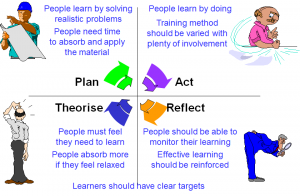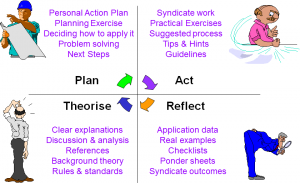It used to be thought that learning was something people did when they were at school or on a training course of some type. This philosophy was consistent with working patterns that ran unchanging from year to year and where a person with 35 years of experience really was someone with one year of experience 35 times over.
Now our work tends to be infinitely more variable and suprising.
Change and improvement is an ever-present feature of our lives, and we have grown to understand that life IS learning.
So much of our work is now concerned with accommodating changing perspectives, assimilating new information, and reaching new conclusions, and never more so than in meetings. In effective meetings, people come together with differing perspectives and partial information, and leave with a shared perspective and the insights required to support that.
We are continuously required to grow and adapt as the competitive world evolves around us.
Understanding that so much of our work is now about ‘learning’ can be very helpful, not least for the insight that research into learning provides us in practical ways to bring it about and make it more efficient.
 Two of those insights concern an educationalist called David Kolb, whose observations* lead to the concepts of a ‘Learning Cycle’ (that we all need to work through a cycle of steps to arrive at learning and to sustainably install it in our thinking) and ‘Learning Styles’ (that we all have different preferences for stages within that cycle).
Two of those insights concern an educationalist called David Kolb, whose observations* lead to the concepts of a ‘Learning Cycle’ (that we all need to work through a cycle of steps to arrive at learning and to sustainably install it in our thinking) and ‘Learning Styles’ (that we all have different preferences for stages within that cycle).The diagram on the right reflects both the cycle (act > reflect > theorise > plan) and the labels given to those people whose preferences lead them to emphasise certain parts of that cycle.
Everybody still has to progress through the complete cycle, but we will tend to find that activists are prone to rushing through their reflections, analysis, and adjustments so that they can get back into the experience, while theorists are likely to spend more time modeling the possible explanations before they set out to gather a bit more real experience to validate those models.
 Developing meetings to fulfil the requirements of the different styles is not as difficult as it appears. Especially since we need to complete learning cycles anyway. But the important thing is to ensure balance, particularly if you as the meeting organiser have a particularly strong bias to one of the styles yourself.
Developing meetings to fulfil the requirements of the different styles is not as difficult as it appears. Especially since we need to complete learning cycles anyway. But the important thing is to ensure balance, particularly if you as the meeting organiser have a particularly strong bias to one of the styles yourself.We naturally tend to see ourselves as normal and balanced, and so understanding our bias can help us adjust to better meet the needs of our group. The diagram on the left illustrates the implications that accommodating the different styles will have for your meeting:
These principles are evident in all good meeting design:
- They encourage rational explanations and logical arguments for people to understand the reasoning
- They provide opportunities for people to test out their own thinking and handle the responses that emerge
- They give time for people to reflect on what they have seen emerge, and to reconcile this with their thinking
- They encourage people to plan their next steps
 These principles can be further supported by including different elements within your meetings. The following slides illustrate them in the four different areas to assist you in identifying those you might choose to bring a better balance to your meetings.
These principles can be further supported by including different elements within your meetings. The following slides illustrate them in the four different areas to assist you in identifying those you might choose to bring a better balance to your meetings.————————-
* ‘Toward an applied theory of experiential learning’, Kolb and Fry, in Theories of Group Process, Cooper (ed.), John Wiley, 1975.
Please subscribe to access clinic content
Subscription to the Inspirometer Information Service is free of charge and grants you instant access to a wealth of meeting effectiveness resources and guidance. It also provides you with regular updates direct to your mailbox at a frequency of your choosing.
I am happy to consent to the Inspirometer cookies and Terms and Conditions
Your use of the Inspirometer Information Service is subject to the following terms and conditions, and is subject to our privacy policy which can be reviewed here: https://inspirometer.com/privacy-policy
■ We will not use your information for any other purpose than to keep you informed of developments in meeting effectiveness and the Inspirometer system, and we will not share your information with others.
■ You are able to unsubscribe from this service at any time. Each email you receive from us will contain a link where you can reset your preferences for all future emails, or unsubscribe for the service entirely.
■ We will contact you on a minimum of a quarterly basis to ensure that our service is continuing to meet your needs, to give you a general update on key developments in our service, and to provide you with the option to change your contact preferences
■ We will hold your data on file to enable your access to the Information Service until such time as you unsubscribe from the service
■ If we hold your data outside of the information service as a result of you contacting us by email or purchasing our service, we will hold your data in accordance with our Privacy Policy (https://inspirometer.com/privacy-policy). We will delete such data, in situations where we are not legally required to retain it, on receipt of a verified request from you
■ All information provided by us is provided in good faith. All information submitted by you is to be provided in good faith.
■ In compliance with the GDPR 2018, you acknowledge that clicking the subscribe button grants us your consent to hold the data you have provided, and to contact you using that data, in the manner described above.
■ We will not use your information for any other purpose than to keep you informed of developments in meeting effectiveness and the Inspirometer system, and we will not share your information with others.
■ You are able to unsubscribe from this service at any time. Each email you receive from us will contain a link where you can reset your preferences for all future emails, or unsubscribe for the service entirely.
■ We will contact you on a minimum of a quarterly basis to ensure that our service is continuing to meet your needs, to give you a general update on key developments in our service, and to provide you with the option to change your contact preferences
■ We will hold your data on file to enable your access to the Information Service until such time as you unsubscribe from the service
■ If we hold your data outside of the information service as a result of you contacting us by email or purchasing our service, we will hold your data in accordance with our Privacy Policy (https://inspirometer.com/privacy-policy). We will delete such data, in situations where we are not legally required to retain it, on receipt of a verified request from you
■ All information provided by us is provided in good faith. All information submitted by you is to be provided in good faith.
■ In compliance with the GDPR 2018, you acknowledge that clicking the subscribe button grants us your consent to hold the data you have provided, and to contact you using that data, in the manner described above.
Track your progress to ensure the efficacy of this strategy.
